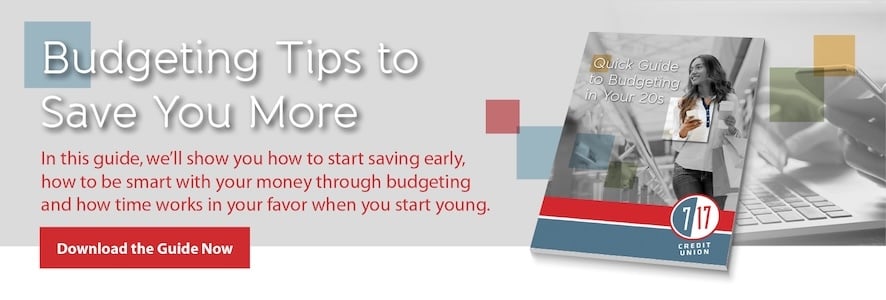- 7 17 Staff
5 Money Management Skills To Help You Plan for Your Future

If you find yourself worrying about finances, it’s important to know you’re not alone. Money is a common source of worry in many people’s lives. In fact, more than a third of U.S. adults feel anxiety over their finances.
One of the top skills to cultivate throughout life is money management and making the most of your money, but figuring out how to do that can be overwhelming. Let’s explore some money management tips and skills to help you increase your confidence and better plan for your future.
Money Management Skills to Help Plan for Your Future
Figuring out how to manage your money is important for your financial stability. It involves planning out what to do with your money in order to make the most of it. Generally, this involves reducing your debt, budgeting, and planning for your future. Let’s take a deeper look at these strategies.
Make a Budget
One of the top money management skills that will help you plan for your future is creating and following a budget. Those who feel more anxiety over finances tend to not follow a budget, so they may spend their income impulsively. To create a budget, add up all of your sources of income within a month, then add up your monthly expenses and subtract your expenses from your income.
As you’re creating your budget, take an inventory of your spending. How much is on necessities? Are you paying for streaming services that you’re not using often, if at all? This is a good time to evaluate where your income is going and where you can make cuts to reduce your spending.
Track Your Spending
One of the top skills to master is tracking your spending. This will help you see where your extra spending is occurring, how much it is, and how often it’s happening.
For example, are you spending too much each week on lattes from a coffee shop every day? Do you find yourself going to a favorite bookstore or clothing store more than you need to? Are you going out to eat for lunch or dinner too often?
These are the questions that tracking your spending via a money management app or your mobile banking app will help you answer. From there, you’ll be better able to make cuts to your spending, put money into savings, and even pay off your debts.
Start an Emergency Fund
Don’t forget about your savings and emergency fund. It’s important to have approximately 3–6 months’ worth of monthly bills saved in your emergency fund in case of job loss, medical costs, or other unexpected expenses.
To start your emergency fund, choose a system and amount that works best for you. For example, you may choose to set aside a certain amount of money each week, month, or payday. Whichever option you choose, make sure it won’t negatively impact your ability to pay your bills on time or make it difficult to pay for necessities such as groceries.
Pay Off Your Debts
This will take longer to achieve, but it will be worth it if you’re spending a significant amount of money each month on paying off loans. There are several debt payoff methods that you can use, including debt consolidation, the avalanche method, and the snowball method.
Debt consolidation involves combining multiple debts so that you have one debt and payment each month. This is generally done with a personal loan, which you use to pay off the debts so that you only have one monthly payment, or through a balance transfer credit card. With a balance transfer credit card, you’ll transfer the balances from your other credit cards over to the balance transfer card.
The debt avalanche method involves directing extra funds each month toward a credit card or loan with the highest interest rate while continuing to make minimum payments toward the other accounts. Once that card or loan is paid off, you’ll then direct those funds toward the account with the next highest interest rate.
With the snowball method of debt payoff, you’ll direct extra funds toward the account with the lowest balance while making minimum payments on the other accounts. Once the account is paid off, you’ll direct those funds toward the next highest balance.
Use Credit Cards Wisely
When used strategically, credit cards are great tools to earn rewards such as airline miles, cash back, and more. To use your credit card wisely, use it to pay for a purchase that you have the funds to immediately pay off.
After making the purchase, pay off the balance completely. This will help you improve your credit score while potentially earning rewards benefits, depending on your credit card.
Additionally, try to avoid only paying the minimum payment (unless you’re doing the debt avalanche or snowball methods discussed above). This can result in hundreds if not thousands of extra dollars spent toward interest.
Ready to Save and Budget Well?
7 17 Credit Union has several resources that can help, including our free guide, Budgeting for Beginners.
